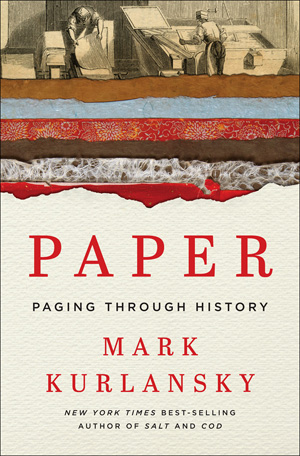Most of us spend very little time thinking about paper, but for a moment, consider its abundance in our day-to-day lives. Even for those that eschew physical books, notepads, and snail mail, it can be hard to ignore paper’s many other forms: wall paper, toilet paper, movie posters, restaurant receipts, product packaging, and billboard advertisements, to name just a handful. The stuff is everywhere, and since its invention in China around 2,000 years ago, paper has played a pivotal role in art, education, communication, and bureaucracy. In his new book Paper: Paging Through History, Mark Kurlansky chronicles the impact paper has had in our society over these many years.

Anyone familiar with Steven Johnson’s How We Got to Now, the book or the PBS documentary, will be familiar with the style Kurlansky uses in Paper. Rather than dictating a straight timeline of events, Kurlansky describes the history of society with paper at its center-point. In other words, while the invention and technical development of paper is a main feature, the broader lesson is in how paper affected subjects like literacy, spoken language, science, religion, and record-keeping throughout the millennia.
Paper begins with the invention of written language and the use of pre-paper products (such as papyrus, wax tablets, and parchment), as well as a bit of speculation paper’s origins. It then follows the trail of paper from the East, through the Middle East , and into Europe and North America. Along the way the process has changed, new uses for the product were found, and paper-making became a large-scale industry. You might be surprised, but it’s a long journey from manually-produced paper, made primarily from discarded rags, to the machine-produced paper, made primarily from farmed wood-chips. Also included is a discussion of the future of paper in our digital world, the resurgence of artisanal paper, and the environmental impact of the mass-production in paper.
Overall, the style might be a bit on the dry side for some readers. The book isn’t written in the fun, light style of non-fiction authors like Mary Roach or Sarah Vowell. But for those interested in a bit of history, much of it will be truly fascinating. Consider the following question: if paper was invented in China, why did the printed book industry take hold in Europe first? If that’s the sort of thing that makes you scratch your chin, then I’d definitely recommend picking up a copy of Paper.

This seems really interesting. I do wish it was indeed written in the fun less-dry way, but I think history is fascinating enough to keep my attention by itself hah x
LikeLike